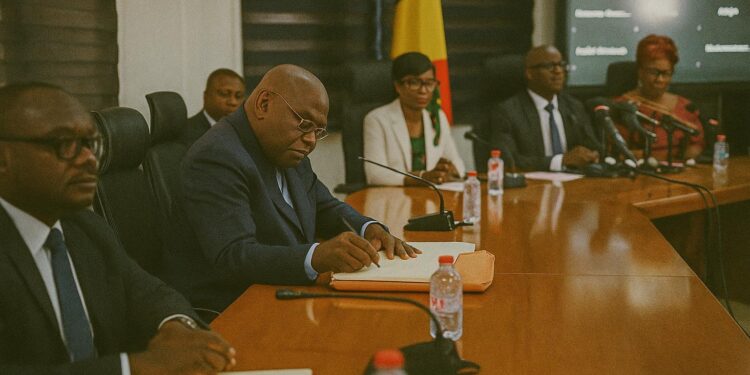A multisectoral discussion in Brazzaville
The second annual meeting of the Congolese EITI executive committee, chaired by Minister of Finance, Budget and Public Portfolio Christian Yoka, unfolded in Brazzaville against a backdrop of cautiously rising commodity prices and renewed diplomatic attention to critical minerals. Representatives of oil majors, mining operators, civil-society forums and state administrations engaged in what several participants described as a “frank yet constructive” exchange, underscoring the consensual character that EITI requires to retain its credibility.
By the close of the session, the committee adopted a roadmap committing the Republic of Congo to publish its 2025 activity report before the end of the current calendar year. That pledge, while ambitious, mirrors the government’s wider strategy to present itself as a predictable partner to multilateral lenders and private investors alike, a point repeatedly emphasised by senior officials throughout the weekend.
Deadlines under diplomatic scrutiny
Internationally, Brazzaville’s delivery timetable will be read not merely as a technocratic exercise but as a signal of governance stability. The EITI International Secretariat, in its 2023 progress overview, noted that countries able to respect reporting deadlines often enjoy lower perception-of-risk premiums in energy-sector financing (International Secretariat, 2023). For Congo, whose hydrocarbon revenues still represent more than half of budgetary resources, the reputational dividend attached to punctual publication is therefore non-trivial.
Officials close to the file contend that the December horizon aligns with preparatory talks under way with development partners, including the African Development Bank, which has highlighted transparency as a prerequisite for concessional lending windows (AfDB Outlook, 2024). Seen from that angle, the report becomes an instrument of economic diplomacy as much as a repository of data.
Corrective measures: the remaining road
Secretary-Permanent Florent Michel Okoko did not mince words when he acknowledged that Brazzaville “still has ground to cover” before the international board can validate its file. The outstanding recommendations include fuller disclosure of production-sharing contracts, a more granular reconciliation of state receipts with company payments and the institutionalisation of gender-sensitive consultations within mining communities. None of these requirements is insurmountable, yet each intersects with complex bureaucratic realities extending well beyond the ministry of finance.
Progress is nonetheless palpable. A presidential decree published in February strengthened the legal mandate of the national EITI secretariat, granting it direct access to fiscal information hitherto siloed inside treasury departments. Meanwhile, major operators have agreed in principle to harmonise their reporting templates with the 2023 EITI standard, thereby reducing the need for ex-post adjustments that previously delayed publication cycles.
Strategic implications for the extractive portfolio
Enhanced transparency dovetails with Brazzaville’s ambition to diversify its production matrix beyond mature offshore oil blocks. Exploratory licences for potash in the Kouilou Basin and for green-hydrogen-ready gas reserves in the Cuvette have attracted preliminary interest from Asian and Middle-Eastern investors. Diplomatic interlocutors argue that timely EITI compliance could tip the balance in favour of investment committees wary of governance risk. As one senior commercial attaché put it, “documentation delivered on schedule is sometimes more persuasive than an additional percentage point on the internal rate of return.”
At the same time, Congolese negotiators are mindful of regional optics. Gabon’s temporary suspension from EITI in 2021 and Chad’s ongoing corrective status serve as cautionary tales. By contrast, Côte d’Ivoire’s rapid validation last year has been cited within CEMAC circles as evidence that Central African states can meet international benchmarks without compromising sovereign prerogatives.
One year, one window
The twelve-month span ahead will determine whether Congo’s declared timetable translates into the public-relations dividend officials anticipate. Technical assistance missions from the World Bank and the German Cooperation Agency are scheduled for July and October respectively, while a peer-learning workshop with Sierra Leone’s EITI chapter—widely praised for its community outreach methodology—could furnish additional momentum.
Ultimately, the convergence of diplomatic, financial and reputational incentives appears to have crystallised a rare political consensus around the calendar. Provided inter-agency data flows function as planned, Brazzaville may enter 2025 not only with an approved report in hand but with reinforced leverage in its conversations with rating agencies and strategic investors. In the words of a veteran Congolese negotiator, “timeliness, in this business, is the most negotiable form of transparency.”











































